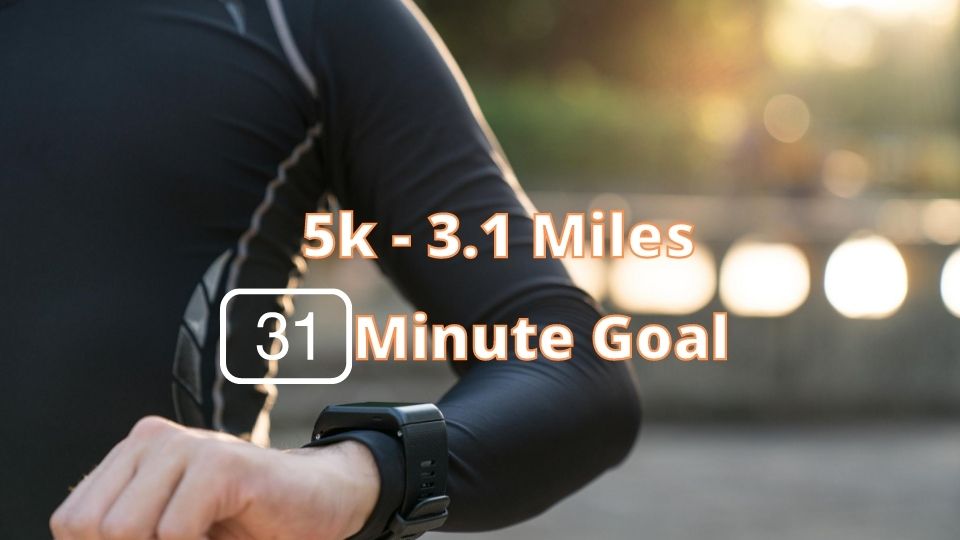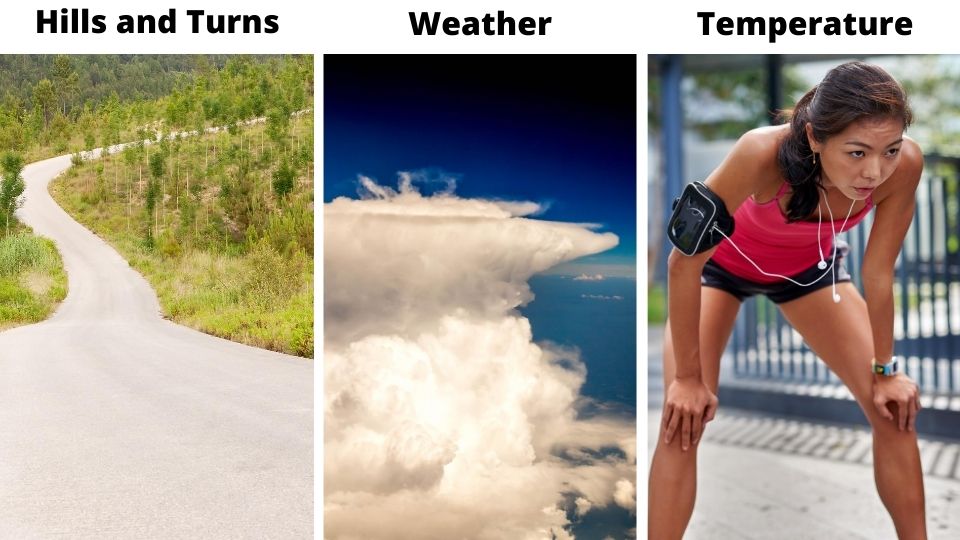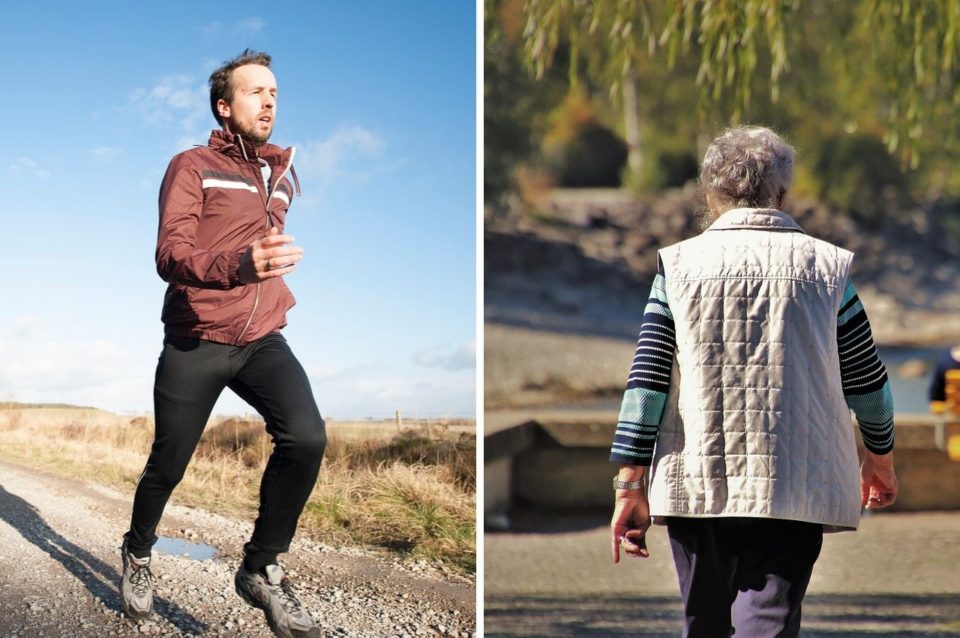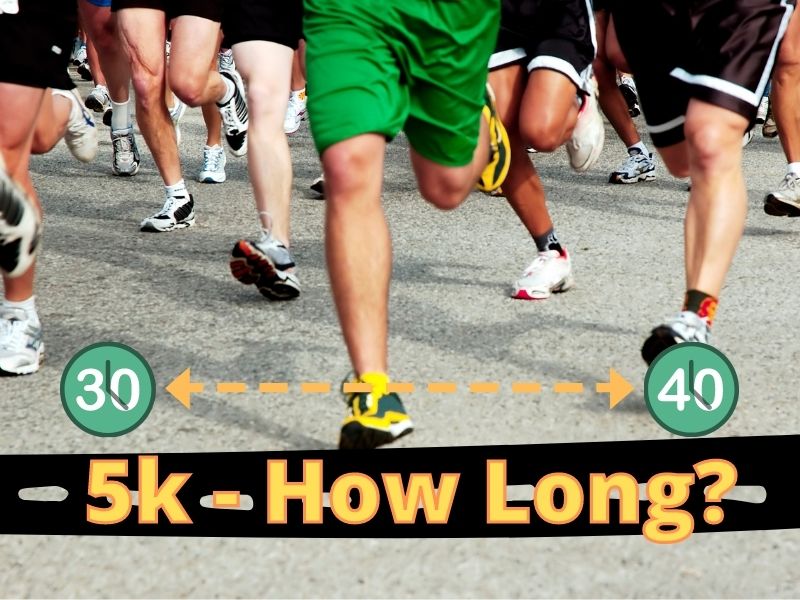If you are getting into running or want to run a manageable distance, then a 5k is an ideal and achievable run for you. If you run through a 5k, you should be happy with yourself without worrying about the results.
The average time it takes for a runner to complete a 5k is about 20 to 25 minutes. A beginner might take between 30 to 40 minutes. To win first place, a male runner should finish a 5k in under 15 minutes and a female runner in under 19 minutes.
Factors like age, gender, health, and fitness level matters and can influence your 5k time. You can also do a run-walk or walk the entire 5k. So, depending on what you want to do, you can make a plan for how long you will take on your next 5k run.
How Long Does It Take To Run A 5k?

Whether you are a beginner runner or a seasoned athlete, you may want to know how long it would take you to finish a 5k. That is because you are hoping to win, you may want to improve your performance, or simply want to know.
To find out how long it takes to run a 5k, it’s better to know how far a 5k race is. 5k means five kilometers, as the “k” stands for a kilometer. A 5k run is mainly equivalent to 3.1 miles. In the US, they use mile markers on the racecourse instead of kilometer markers.
In general, most runners consider 25 minutes a good finishing time for a 5k, which refers to an 8-minute-mile pace. It might be an aggressive speed for you if it’s your first 5k. But if it is not your first race, you can easily estimate how long it will take you to finish a 5k by looking back at your time from previous competitions.
Another way to estimate your time to finish a 5k is to run a mile at the fastest pace possible and comfortably. Then carefully note the timing it took; this will give you your pace. If you ran the mile in 8 minutes, your estimated 5k finish time would be 24 minutes. If it took 18 minutes for the mile, your 5k finishing time would be 54 minutes, and these predictions can go on.
If you are young, healthy, and have run much in your life, consider 31 minutes as your goal, which is a fairly 10-minute-mile pace. But if you want people to say your time is fast, start with a 30 minute-barrier.
It is advisable to look at the previous years’ results as it will help you compare your race times with other runners of your age and gender. This will allow you to have a realistic understanding of race timings.
5k Beginners Time

Suppose you are planning to get into running or have started training for a race. In that case, you may be wondering how long would it take you to finish a 5k or what would be a good finishing time for you as a beginner. Obviously, it varies from person to person depending upon age, gender, and fitness, but a rough timing could be estimated.
If you run a mile in 8 minutes, you can estimate your 5k time around 25 minutes. Though this time isn’t achievable for most people, including beginners, so if you are a beginner, your aim should be to run a mile in 10 to 13 minutes. For a beginner, finishing a 5k in 30 minutes is very good going. However, the average time for a beginner is between 30 to 40 minutes.
Initially, you should concentrate on adding longer jogs and shorter walking into your routine and then work on time. Set up a few weeks or months of a fitness plan for yourself. Balance your routine by adding another low-impact exercise along with running such as swimming and cycling.
In my opinion, as a beginner, you should not stress yourself about finishing time, specifically your first 5k. Instead, your focus should be on other things such as how you are doing, how you feel during the race or the excitement of participation.
In this way, you will be able to make it to the finish line. This might not be your best time, but it will surely help you know what you need for future training. This experience will help you to pay attention to more competitive finishing times.
Requirements before Running a 5K

Athletes usually require about 9 to 12 minutes to cover a mile daily, which means roughly 28 to 37 minutes will be needed to cover a 5k. Nutrition is an essential factor in the preparation of a 5k.
This preparation could include rich proteins, good fats, and complex carbohydrates. It is also helpful to have abundant organic products, green vegetables, and sound protein shakes, fresh fruits, and to cut out your consumption of liquor and processed sweets.
If you are preparing for your 5k run, you must begin slowly and increase the distance over a period of time. This is the safest approach to prepare for a 5k, mainly if this is your first time. Initially, your primary objective is to achieve a 5k race and focus on finishing. There’s no need to punish yourself in case you walked parts of the race to finish.
In case you intend to run a total 5k race, you should make a strategy for how and when you will prepare. The ideal approach to begin is to allocate sufficient time for training. To sufficiently prepare for a 5k as a newcomer, you may require approximately seven to eight weeks.
In case you can’t dedicate the time or focus on a training plan, you probably won’t be prepared enough and might harm yourself. You must consult your doctor before you consider any rigorous training plan.
A mix of walking and running is essential to develop the required power and endurance for 5k training. A mix of this may require 15 seconds running and 45 seconds of a walk.
Initially, begin with three non-back to back days of 20–30 minutes of traveling, a few days of a simple walk (for around 30 minutes), and one day off. Make sure to have appropriate joggers, a sports bra, and warm up with stretching exercises before you begin running.
You should make an effort to get aware of the racecourse in later weeks near the race. Get a map and start familiarizing yourself with the path. It will be an ideal situation if you are capable of running it before race day.
At least, be aware of the slopes and hills, as it might add an extra effort to you on competition day. It’s a line you might hear while racing: “Nothing new on race day”. You might not want to change your strategy on race day, and find it created problems for you.
Factors That Impact Finishing Time for a 5k Race

Race Course Details
Racecourse design and details have a direct impact on your overall experience. Pay attention to down-and-back routes and hairpin turns. These turns and routes force you to suddenly change your directions at 180 degrees, which might cause congestion and loss of momentum.
Make sure to get the necessary information about course maps like elevation, changes, and obstacles from the website to prepare yourself. If you are unaware of these obstacles and turns, they can dock time off of your race.
When running a race you should be clear about the directions for the course. One wrong turn could be extremely upsetting for you, your race time, and your overall experience.
When running a race you should be clear about the directions for the course. One wrong turn could be extremely upsetting for you, your race time, and your overall experience.
To increase your pace, Hill running is fantastic and has enormous benefits such as strengthening and stride efficiency. There is no need to sprint up a hill, but you definitely need to maintain a steady pace.
Hill running strengthens your ankles, calves, glutes, thighs, and helps you prevent injury. You will see an improvement in your stride length and your running form. With healthier muscles and increased leg power, you will be able to finish a 5k run in less time than usual.
Weather
Weather factors such as dew point, wind, precipitation, and cloud cover have a significant impact on the runner’s performance and how long it takes a runner to finish a 5k race.
According to researchers, an optimal temperature for runners is between 44° F, and 59° F. below and above this range may negatively affect the finishing time of a 5k runner.
It takes much more effort for a runner to maintain a reasonable pace in increased temperatures.
Running in heat increases the amount of oxygen you need, which in turn increases lactate production, higher energy usage, and higher heart rate. The warm temperature may also cause fatigue faster as it increases dehydration, leading to reduced stroke volume and blood pressure.
Run/Walking A 5K

The run/walk technique can be a powerful technique, whether you are a beginner or a veteran runner. It has proven to be an effective tool to improve your pace and endurance. There are chances of you to improve your race times if you participate in them.
Most beginner runners wish to start run/walk race techniques as they don’t have the fitness or endurance to run for a more extended period. Also, some experienced runners use this technique to increase their mileage.
For a run/walk 5k race, you need to start walking at your normal pace until your muscles are warmed up a bit. Then run as fast as you can for a half minute.
Then walk again at a normal pace for two minutes and then speed up as much as possible for another half minute. Continue with this cycle of walk/run/walk as much as you are comfortable with. Your ultimate goal should be to get 10 to 12 cycles in a 5k run/walk.
Always remember there will be someone better and someone worse than you. So, enjoy your race without thinking how long it would take you to finish a 5k. When you are finished with the race, you will have a better time and you’ll finally know how long it takes to run a 5K race under real conditions.
Thanks for visiting Helpshoe.com
References
- https://www.verywellfit.com/how-long-will-it-take-me-run-a-5k-2911114
- https://thewiredrunner.com/what-is-a-good-5k-time-for-beginners/
- https://www.mayoclinic.org/healthy-lifestyle/fitness/in-depth/5k-run/art-20050962
- https://www.podiumrunner.com/events/how-much-does-heat-slow-your-race-pace/
- https://www.realbuzz.com/articles-interests/running/article/how-to-turn-a-poor-5k-into-a-fast-time/
- https://www.verywellfit.com/how-to-do-the-runwalk-method-2911203
- https://www.fullstridehealth.com/how-long-does-it-take-to-walk-a-5k
- https://www.healthline.com/health/exercise-fitness/average-5k-time#takeaway

